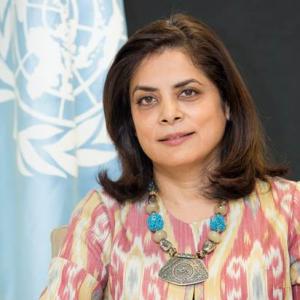Opening Remarks UN Resident Coordinator on IUNCF Plenary Meeting 2019
-
Foreign Minister, Ibu Retno LP Marsudi
Director General Multilateral Affairs, Kemlu, Pak Febrian Ruddyard
Officials from MoFA and all line Ministries
Representatives of UN agencies present here in Indonesia
Distinguished participants, Ladies and Gentlemen,
Before I begin, my sincere condolences to the Govt of Indonesia, and to the family and loved ones of the Indonesian UN staff member who lost her life, along with several UN colleagues and many others in the tragic plane crash in Ethiopia.
On behalf of the UN in Indonesia, our sincere appreciation to the Ministry Foreign Affairs for hosting the fourth plenary meeting of the Indonesia UN Consultative Forum and to all national partners who are participating today and with whom we collaborate with.
The IUNCF provides a unique platform for dialogue between the UN and the Government of Indonesia. I wish to thank the two joint Government and UN Working Groups that have met and are working on a host of issues to facilitate and improve our partnership in several operational and information sharing areas.
Excellencies, Ladies and Gentlemen,
Since the last IUNCF Plenary held in February last year, much has happened on the global stage, at the UN and in Indonesia. We continue to see remarkable global progress on development – more people are coming out of poverty and are better educated and healthier than ever before. Science and technology are breaking new ground and fueling a digital revolution that is changing the way countries and their citizens think and act on development. Young people represent today, a large and dynamic force that will determine the course of our present and future.
At the same time, challenges remain – inequalities, food insecurities, malnutrition, and discrimination against women persist. We see the frequency of natural disasters with damaging, dramatic impacts and with the worst humanitarian consequences. Straddling the ring of fire, Indonesia has had its share of natural disasters as witnessed in Central Sulawesi, Lombok and Sunda Straits, but we have also seen the determined effort of the Government’s response and we were pleased to support this nationally led response.
As the movement of people within and across borders has escalated, member states have come together and in 2018, the UN General Assembly endorsed the Global Compact on Refugees and the Global Compact on Safe, Orderly and Regular Migration.
And precisely at a time when challenges such as the impact of climate change, entrenched conflicts and the growing threat of terrorism call for cross-border, regional and global solutions, we are seeing multi-lateralism under threat in some parts of the world.
I would like to commend the Government of Indonesia for its remarkable contributions in bringing countries closer together and helping frame common narratives around common challenge and solutions such as on maritime issues, on the circular economy, peace-keeping and peace building and so many other areas.
I would also like to commend Indonesia for its leadership in accelerating the SDGs in Indonesia and we have been very pleased to continue to partner with you in these efforts. Indonesia’s initiative in organizing the Bali ASEAN leaders gathering on the SDGs late last year was an important milestone, in which the UN Secretary-General was pleased to participate. Indonesia continues to be a close partner of the UN in advancing the ASEAN UN Comprehensive Partnership.
In July 2018, in response to the proposals and vision put forward by the UN Secretary-General, the UN General Assembly adopted a resolution on Repositioning the UN Development System to deliver on the 2030 Agenda. The Resolution calls for several bold changes at the global, regional and country levels. At the country level it calls for a strengthened Resident Coordinator system to partner with countries to deliver on the ambitious and complex 2030 Agenda. The Resolution also calls for the current UN planning frameworks in the country (UNDAF/UNPDF) to be positioned as the single most important UN country planning instrument, responding to national priorities and in support of the 2030 Agenda, with a more robust planning process and with individual country programme documents aligned with it.
The reform is expected to lead to higher quality, more integrated, and appropriately tailored operational support and policy advice for governments to meet the SDGs.
The UN in Indonesia will soon be embarking on the preparation for a new UN Partnership for Development Framework (UNPDF) for the period 2021-2025 aligned closely with your RPJMN (national development plan) and responding to your national priorities and we look forward to working with and all partners in this preparation process.
We look forward to continue supporting Indonesia’s role in various global and regional fora, including at the ESCAP Regional Conference on the SDGs at the end of March, the SDG Investment Fair in mid-April, the High Level Political Forum in July 2019, where Indonesia will for the the second time present its progress on the SDGs on the global stage, and the UN Secretary-General’s Climate Summit in September of this year.
Today we will be discussing the important theme of South South cooperation and our shared experiences in this regard. There is growing consensus throughout the United Nations system that South-South learning and policy coordination and the transfer of expertise and technology are effective ways to accelerate sustainable development. Here in Indonesia, we have been pleased to work with national partners in sharing Indonesia’s rich experience overseas.
And finally, our continued good wishes as you successfully navigate the myriad set of complex issues, during your tenure on the UN Security Council.
Thank you once again to the Ministry of Foreign Affairs for the partnership and hosting of this event and to all our partners.
I look forward to productive discussions.
Thank you very much. Terima Kasih Banyak
Speech by


